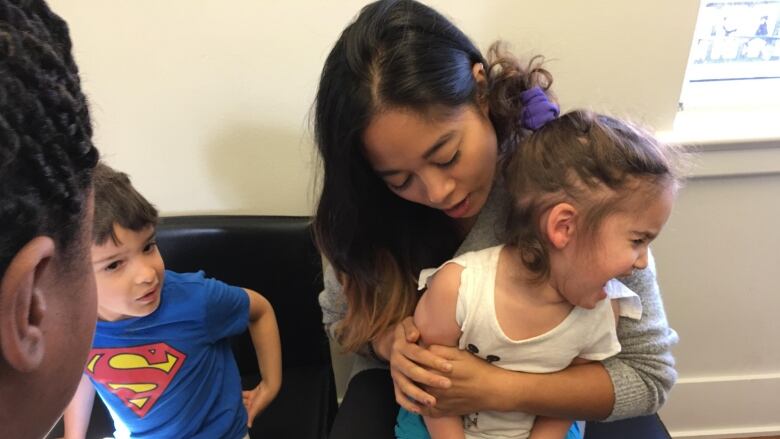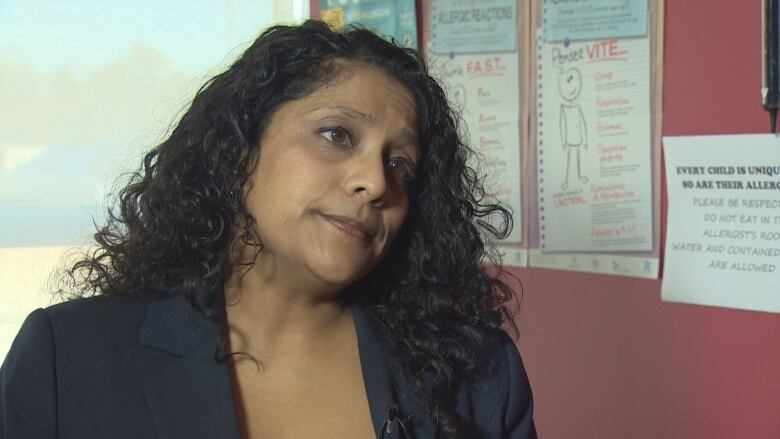Parents can help minimize children's pain from vaccinations, study says
Repeatedly telling a child 'it's OK' actually causes more distress, researcher says

Four-year-old Harrison watches curiously as the nurse approaches his two-year-oldsister, Georgia, to give her the flu shot at a Toronto pediatric clinic.
But his curiosity quickly turns to alarm when Georgia bursts into tears as the needle goes in.
"I don't want that!" he says."Owee!"
Their caregiver, MariaZaguirre, tries her best to keep them calm.
"It's over in a few seconds and then you get to choose a big sticker," she says. Then, she asksthem to count to 10 with her.
When the shot is overand Georgia and Harrison get their stickers, thetears quickly stop.
"Before they would take a lot longer to calm down, but counting kind of helps," Zaguirresays.
According to Health Canada,influenza season has officially begun, and flu-related hospitalizations are higher than expected for this time of year. Health-care providers are stressing the importance of getting the flu shot especially for those at risk of complications a group that includes young children.
As parents and caregivers try to find ways to help kids through getting a needle like Zaguirre'scounting technique a recentstudy published in the journal Pain says parents can directly affect the pain and distress their children feel.
The researchers wanted to determine"the factors, both parent and child, that contribute or make children that are more reactive or experience more pain after a needle," saidRebecca PillaiRiddell, lead author of the study and head of York University's O.U.C.H. (Opportunities to Understand Childhood Hurt) laboratory.
They analyzed data from hundreds of children who had been followed through their regular vaccinations from when they were about two months old until they were about four and a half years old.
The results suggested that the way parents and caregivers behaved during medical appointments not only helped shape the way their babycoped during their 12-month vaccination,but also affected how much distress and pain the children experienced after aneedle duringfuture vaccinations.
"How they react in those few minutes, we can predict years ahead of time part of how they're going to react after a needle when they're preschoolers," PillaiRiddellsaid.

Some of the parental behaviour that helped reducethe pain their children experienced while getting a needle included "holding thechild close, not being stressed yourself, being a calm parentand really regulating your own distress, because the children, especially young children, pick up on your distress and that makes them more distressed," she said.
'Distress-promoting' behaviour
But those "good behaviours" alone weren't enough, PillaiRiddell said. It was even more important for parents to avoid "distress-promoting" behaviours that can affectchildren negatively, even though they are well intended.
One example, she said, was repeated verbal reassurance such as saying "it's OK" over and over again, because it communicates the parent's own anxiety.
"In normal situations parents don't talk like that," she said."When things are OK, and you're walking down the street and you're going to the park with your child, are you constantly telling them, 'everything's OK, it's OK, it's OK?'The fact that you're reassuring actually suggests that you don't think it's OK."
Another "distress-promoting" behaviour, the study found, was apologizing to the child.
"[Saying] 'I'm so sorry you're going through this, oh Mommy is so sorry. I wish Mommy couldtake this needle for you or I wish Daddy could do this for you.' So that actually also makes a child aroused and worried about the situation," PillaiRiddell said.
Being honest with children about the fact the needle will hurt, but emphasizing that the pain will pass quickly and reminding them of the normal activities they're going to do afterward such as soccer practice is also important, she said.
With files from Kas Roussy and Marcy Cuttler












_(720p).jpg)


 OFFICIAL HD MUSIC VIDEO.jpg)
.jpg)



























































































